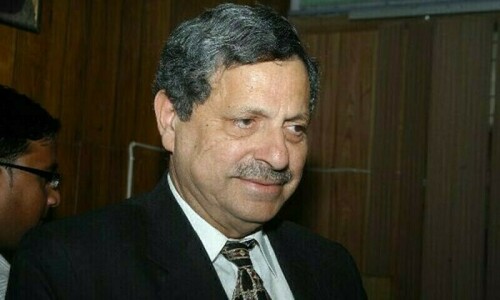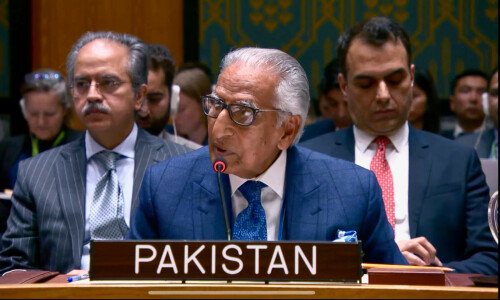As the Supreme Court’s constitutional bench on Tuesday took up the hearing on the appeals against the decision to try civilians in military courts, Justice Jamal Khan Mandokhail said that executives cannot play the role of the judiciary.
On December 13, the SC’s constitutional bench conditionally allowed military courts to pronounce reserved verdicts of 85 civilians who were still in custody for their alleged involvement in the May 9 riots in 2023.
On Dec 21, military courts sentenced 25 civilians to prison terms ranging from two to 10 years for their involvement in violent attacks on military installations during the May 9 riots. A week later, another 60 civilians were handed jail terms ranging from two to 10 years for their involvement in the nationwide riots.
On January 2, the mercy petitions of 19 convicts involved in the May 9 cases were accepted on humanitarian grounds.
Yesterday, senior bar leader Senator Hamid Khan said lawyers shared a unanimous opinion against trials of civilians by military courts, calling the sentences “unconstitutional”.
Tuesday’s hearing was taken up by the constitutional bench headed by Justice Aminuddin Khan, who remarked that the bench would only hear military court cases.
During the hearing, Advocate Khawaja Haris appeared as the defence ministry’s lawyer.
“In the past, the Supreme Court had declared that civilians can be court-martialed under military courts,” Haris said.
Justice Jamal Mandokhail asked who the aggrieved party and appellant were in the present case. In response, Haris said that the appeal had been filed by the Ministry of Defence.
“Is the Ministry of Defense an executive institution? If there is a crime against the executive, will it become a judge and decide?” Justice Mandokhail questioned.
“The division of power in the Constitution is very clear, that the executive cannot play the role of judiciary. There is a basic constitutional question when it comes to military courts,” Justice Mandokhail said.
Haris said that if there was no other forum available, then the executive could make a decision.
To this, Justice Mandokhail replied that anti-terrorism courts served as the relevant forums under the law.
“How can the executive itself become a judge while being a legal forum?” he wondered, to which the defence lawyer said he agreed with the justice’s remarks.
Justice Mandokhail went on to say that Article 8(3) of the Constitution was about discipline and performance of the army.
“Can criminal matters be included in Article 8(3)?” he said, going on to say that the Constitution mentioned citizens of Pakistan, not just citizens.
“Those belonging to the Pakistani armed forces were equal citizens, just like other civilians,” Haris said.
“The question is how people of the armed forces can be deprived of fundamental rights,” Justice Mandokhail said.
The back-and-forth arguments between the two continued, with Haris asserting that the Army Act could not be challenged based on fundamental constitutional rights.
If a citizen becomes part of the army, does he wash his hands off fundamental rights, Justice Mandokhail asked. “The issue of military courts is separate from Article 175 of the Constitution.”
“If a citizen, despite being stopped, wants to go to a military checkpoint, then what will happen? Will the citizen be tried in military courts?” Justice Mandokhail remarked.
“Well, now you’ve mentioned a particular situation, I can’t say anything about that,” Haris admitted, referring to the May 9 riots.
“This is the most relevant question,” Justice Musarrat Hilali chimed in.
The answer to this is very simple, Justice Mazhar went on to say. “If he is found guilty of an offence under the Army Act, then the trial will go on. Nothing will happen if he is found just standing next to a checkpost.”
The hearing was adjourned till tomorrow.
















































